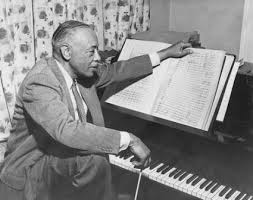Four things the National Symphony could have done to bring diversity to the classical half of their season-opening gala:
 Instead of opening with Dvorak’s festive Carnival Overture, they could have opened with the Festive Overture by William Grant Still, the leading African-American composer of the 20th century.
Instead of opening with Dvorak’s festive Carnival Overture, they could have opened with the Festive Overture by William Grant Still, the leading African-American composer of the 20th century.
Instead of Lang Lang, they could have had a black soloist.
They could have started the concert not only with the “Star-Spangled Banner” (which they always play at their season opening), but also with “Lift Every Voice and Sing,” an inspiring song known for generations as “the Negro national anthem.”
They could have ended the classical half of the program with an unusual encore — the musicians in the orchestra singing a spiritual. Crazy Idea? Not to me. The most impressive moment at any classical concert I heard last season came when the Budapest Festival Orchestra came to the Kennedy Center, and for its encore sang — so beautifully! — a Russian Orthodox piece, in a 19th century a cappella arrangement. I’ve heard that they have a long history of singing at their concerts, but still — if they can do it, the NSO could.
Going further
Now I should explain that the opening gala was in two parts, classical music before intermission, and a pops concert after. And that the pops concert featured black singers (plus music by black composers), to honor the opening of the National Museum of African-American History and Culture.
And what made me think of bringing diversity to the first half was this rebuke I got on Facebook (part of the pushback I got there on my post):
Greg, you have spoken long and hard about the lack of diversity in classical music. Here was a concert that celebrated diversity and the opening of the National Museum of African-American History and Culture by featuring black performers. That fact was relegated to a footnote in your critical review…Too bad you missed the opportunity.
But I don’t think the NSO’s pops programming here had any great meaning for diversity. Not that I’m not glad they did it, but considering the excitement not just in DC but nationally about the museum, the NSO was only doing what they had to do. What they would have been scorned for not doing.
So, with no disrespect to them, they showed no larger commitment to diversity. Especially since if you’re doing a pops concert, doing black music isn’t any big stretch. Jazz and pop are already diverse. The NSO (and no blame for this) just jumped on the train.
Though they do get credit for commissioning two works from African-American composers, Adolphus Hailstork and Mervyn Warren. That took more planning, and I apologize for not acknowledging this sooner. But still, given how huge the museum opening was, I do feel that wasn’t a striking move, one that might signal a new direction for the orchestra.
A new path
What might signal a new direction? (Or at least show that one is possible?) Bringing diversity to the classical half of the program! Because that’s the great diversity need in classical music. Bringing people of color — and their culture — into the heart of classical music.
Thus my ideas. I wish the NSO had thought of them. And, to be honest, I wish I’d thought of them earlier. Because I have to thank my critic. It never dawned on me that the NSO could have made the classical half of their gala more diverse until I responded to my critic on Facebook.
But wasn’t Dvorak diversity programming? Given his pioneering embrace of Native American and African-American music. That’s another thought that was offered me on Facebook, but in another post I’ll suggest why playing the Carnival Overture really doesn’t register as diversity. And why we in classical music overplay what Dvorak did.

Fine suggestions, particularly the suggestion about Still’s work.. What also might be a good idea for the future would be to pick a living African American composer like Mark Abels, and perform one of his culturally and politically relevant pieces, like “Global Warming.” It is beautiful and speaks directly to what our society and globe are facing today. Or one of the solo or ensemble pieces by Tania León, an Afrolatina American composer. Or something by Bill Banfield, or Jonathan Bailey Holland, or T. J. Anderson, Jr., or Daniel Roumain, or Regina Harris Baiocchi, or Anthony Davis, or Leslie Adams, or Alvin Singleton, etc. There are so many living black composers, let alone latinx composers (Roberto Sierra, who is Puerto Rican, etc.), whose work might have worked well. But it seems most classical orchestras, play this rich trove of music very rarely, if at all.. Why?